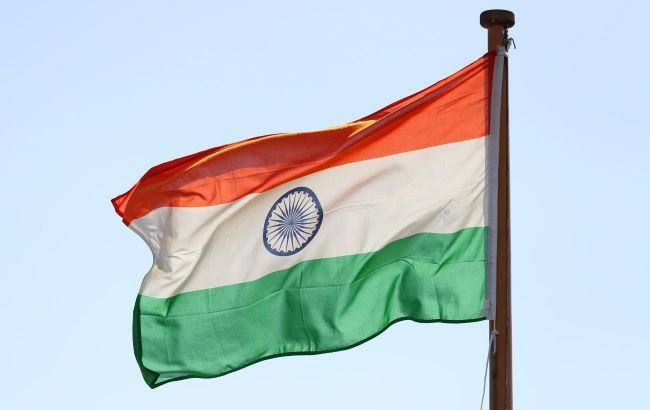India transfers shells to Ukraine despite Moscow's protests
 India's flag (Getty Images)
India's flag (Getty Images)
Indian-made artillery shells, sold by local weapons manufacturers, have been redirected by European buyers to Ukraine, despite Moscow's objections. New Delhi has chosen not to intervene to halt the trade, citing Reuters.
The transfer of ammunition to support Ukraine’s defense against Russia has been ongoing for over a year, according to sources and customs data. Three Indian officials said that the Kremlin raised this issue at least twice, including during a July meeting between Russian Foreign Minister Sergey Lavrov and his Indian counterpart.
Details of these ammunition supplies have been revealed by Reuters for the first time.
Two Indian government sources and two defense industry sources informed Reuters that Delhi had produced only a very small amount of ammunition used by Ukraine, with one official estimating it to be less than 1% of the total weaponry imported by Kyiv since the war began.
According to a Spanish and a senior Indian official, as well as a former top executive at Yantra India, a state-owned company whose ammunition is used in Ukraine, European countries sending Indian-made ammunition include Italy and Czechia, the latter leading an initiative to supply artillery shells to Kyiv from outside the European Union.
An Indian government official said that Delhi is monitoring the situation. However, along with a defense industry leader familiar with the supply chain, they noted that India has taken no steps to limit exports to Europe. Like most of the 20 individuals interviewed by Reuters, they spoke on condition of anonymity.
Delhi and Washington, Ukraine’s principal security backer, have recently strengthened defense and diplomatic cooperation amid the growing influence of China, which both nations consider their main rival.
India also maintains warm relations with Russia, its primary weapons supplier for decades. Prime Minister Narendra Modi has refused to join the West’s sanctions regime against Moscow.
However, India, historically the world's largest arms importer, also views the prolonged war in Europe as an opportunity to expand its nascent weapons export sector, according to six Indian sources familiar with the official stance.
According to data from the Stockholm International Peace Research Institute, from 2018 to 2023, India exported over $3 billion worth of arms.
Defense Minister Rajnath Singh announced at a conference on August 30 that military exports surpassed $2.5 billion in the last fiscal year, and Delhi aims to boost this figure to around $6 billion by 2029.
Commercially available customs records show that in the two years leading up to the February 2022 invasion, three major Indian ammunition producers – Yantra, Munitions India, and Kalyani Strategic Systems – exported $2.8 million worth of ammunition components to Italy, Czechia, Spain, and Slovenia, where defense contractors invested heavily in supply chains for Ukraine.
From February 2022 to July 2024, this figure rose to $135.25 million, including fully manufactured ammunition, which India began exporting to four countries.
Discreet supplies
According to a former senior Yantra executive, one of the companies supplying Indian-made shells to Ukraine was the non-public Italian defense contractor Meccanica per l'Elettronica e Servomeccanismi (MES).
MES is Yantra's largest overseas client. The executive said that the Rome-based company buys empty shells from India and fills them with explosives.
The executive said that several Western firms can fill ammunition with explosives but lack the production capacity to mass-produce artillery shells.
Yantra's 2022–2023 annual report mentions a deal with an unnamed Italian client to create a production line for L15A1 shells, which the former Yantra executive identified as MES.
Customs data shows that from February 2022 to July 2024, Yantra supplied $35 million worth of empty 155mm L15A1 shells.
Records also indicate that in February 2024, British arms company Dince Hill, whose board includes a senior MES executive, exported $6.7 million worth of ammunition from Italy to Ukraine.
Among the exported goods were 155mm L15A1 shells, which, according to the customs declaration, were manufactured by MES for Ukraine’s Ministry of Defense for "promoting the defense capability and mobilization readiness of Ukraine."
Additionally, Spanish Transport Minister Óscar Puente shared on social media that in May, a Czech military official signed an end-user agreement allowing the transfer of 120mm and 125mm ammunition from Munitions India to Czech arms dealer Czech Defence Systems.
Pro-Palestinian activists claimed that the ship Borkum, which carried Indian-made weapons and stopped in a Spanish port, was transporting arms to Israel.
However, Spanish newspaper El Mundo reported in May that the final destination was Ukraine. A Spanish official and another source familiar with the matter confirmed to Reuters that Kyiv was the end user.
Customs records from March 27 show that Munitions India shipped 10,000 120mm and 125mm mortar shells worth over $9 million from Chennai to CDS.
Russian response
Russia, which supplies over 60% of India's arms imports, remains a valuable partner for Delhi. In July, Modi chose Moscow for his first bilateral international visit after winning his third term.
At another meeting that same month in Kazakhstan between senior Indian diplomat Subrahmanyam Jaishankar and Lavrov, the Russian minister pressed his counterpart over Indian ammunition being used by Ukrainians, complaining that some of it was produced by state-owned Indian companies.
Walter Ladwig, a South Asia security expert at King’s College London, said that the redirection of a small amount of ammunition was geopolitically advantageous for Delhi.
"It allows India to show partners in the West that it is not 'on Russia's side' in the Russia-Ukraine conflict," he said, adding that Moscow has limited leverage over Delhi’s decision-making.

